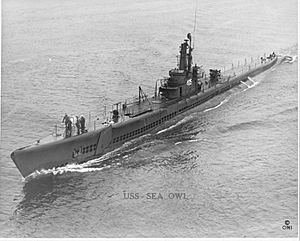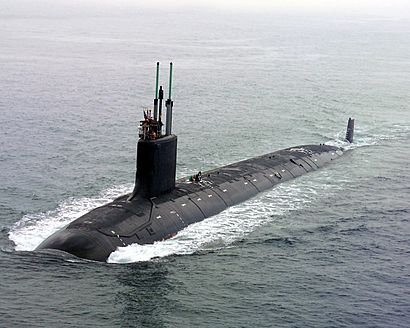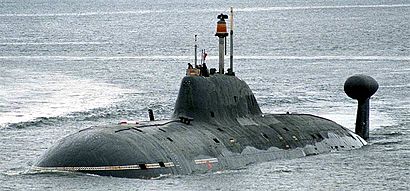Submarine facts for kids


A submarine (or Sub) is a vessel that goes under water. Most large submarines are war vessels. They are used in navies. Some small ones are used for scientific or business purposes. The smaller subs are often called "submersibles" and cannot go far or stay long away from base. Some rich people buy their submersibles own to explore under the sea and look at fish. A submarine is always called a boat, not a ship.
History
In early times, submarines were often powered by hand. This is because boat engines had not been invented yet. They were almost always designed to be used for war. Submarines would try to sink enemy ships by crude methods. These included drilling screws into their wooden hulls. Some tried to blow up a ship. This often destroyed the submarine, too.
Later, during the First and Second World Wars, people invented ways to make better submarines. Many of these better submarines were created by Germany. The submarines were powered by a diesel-electric system. A diesel motor would turn a generator. The generator would charge a large number of batteries while the submarine was above the water. This power was then used to power the submarine when it went underwater. These submarines were dangerous for enemies. They were hard to see while underwater, but it was easy to attack them when they were above the water and recharging.
The First Battle of the Atlantic was the first major battle that was mainly fought between submarines and their enemies. As in later wars, the main jobs of submarines were to enforce blockade and to sink enemy warships. They usually attacked freighters at night, shooting with their guns and then hiding under the water. Sometimes they used their torpedoes, especially against large ships and warships.
After World War II better sonar helped the enemies of submarines to find and kill them. New subs were more streamlined and had no artillery because water dragging against the guns made noise underwater and slowed the subs.
Modern submarines
Most large modern military submarines are powered by nuclear reactors. These submarines often have a system that can get air from the seawater. These two things allow them to stay underwater for long periods. Their most important uses are attacking ships or launching missiles. These include cruise missiles and nuclear missiles.
There are two main kinds of subs. Attack submarines are small and fast. They attack other subs and surface ships with a special kind of underwater bomb called a torpedo. Missile subs are larger and slower. They are built to shoot missiles at far-away targets on land. Missile subs are usually big enough to carry commandos and launch them safely from their torpedo tubes.
Interesting facts about submarines
- The word submarine originates from the Latin sub referring to "under or below" and the Latin marines, meaning "related to the sea."
- Early records from 415 BC show that, at the Siege of Syracuse, the military used submarines.
- When submarines were first invented, they were able to hold 1-2 passengers. Now, some submarines can hold over 100 people.
- A French inventor, Edme Hippolyte Marie-Davy, created the periscope for naval use in 1854.
- Even though submarines are called boats, their title is United States Ship - USS, like the USS Alabama or the USS Nautilus.
- The first nuclear-powered submarine was the USS Nautilus.
- Submarines navigate underwater by using sonar.
- Ballast tanks are giant compartments in the submarine that fill up with water. As the submarine takes on more water, it sinks. When the crew wants the sub to rise, it lets some of the water out of the ballasts.
- Some submarines can remain under the water surface for months.
- While Navy members are learning how to escape a submarine, they must yell HO, HO, HO as they rise to the surface to avoid collapsing their lungs from the pressure change.
Images for kids
-
Drebbel, the first navigable submarine
-
The Mésoscaphe Auguste Piccard (model pictured), built by Jacques Piccard for the 1964 Swiss national exhibition, is the first tourism submarine in history. It transported some 33,000 tourists through the depths of Lake Geneva during 1964–65.
-
In 1960, Jacques Piccard and Don Walsh were the first people to explore the deepest part of the world's ocean, and the deepest location on the surface of the Earth's crust, in the Bathyscaphe Trieste designed by Auguste Piccard.
See also
 In Spanish: Submarino para niños
In Spanish: Submarino para niños
















